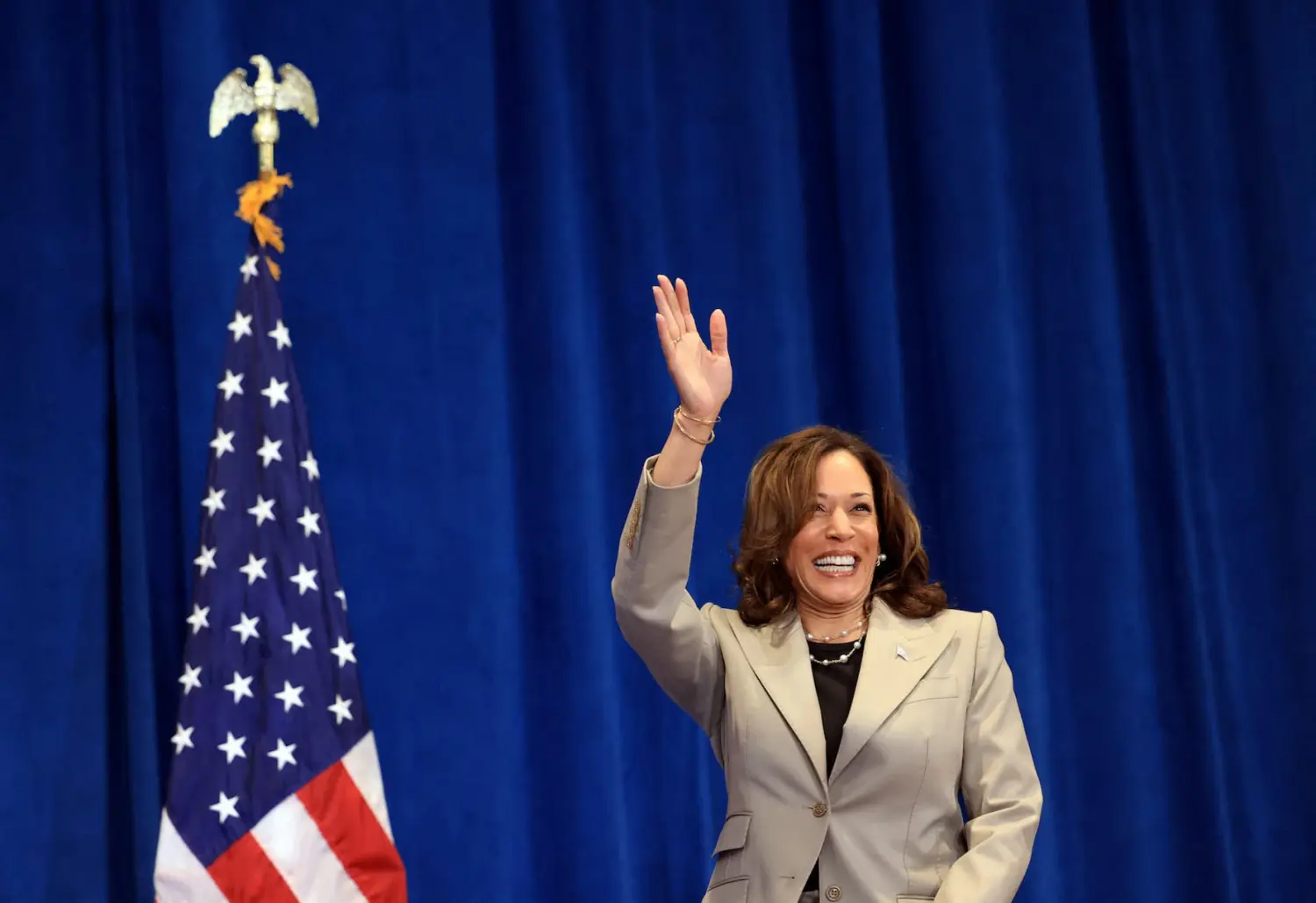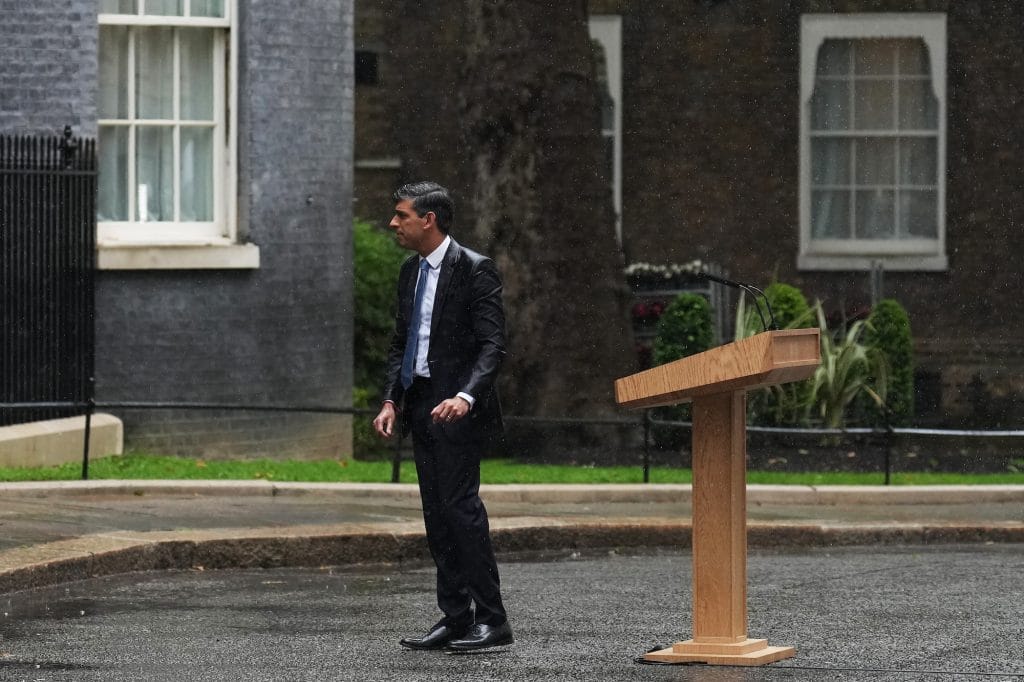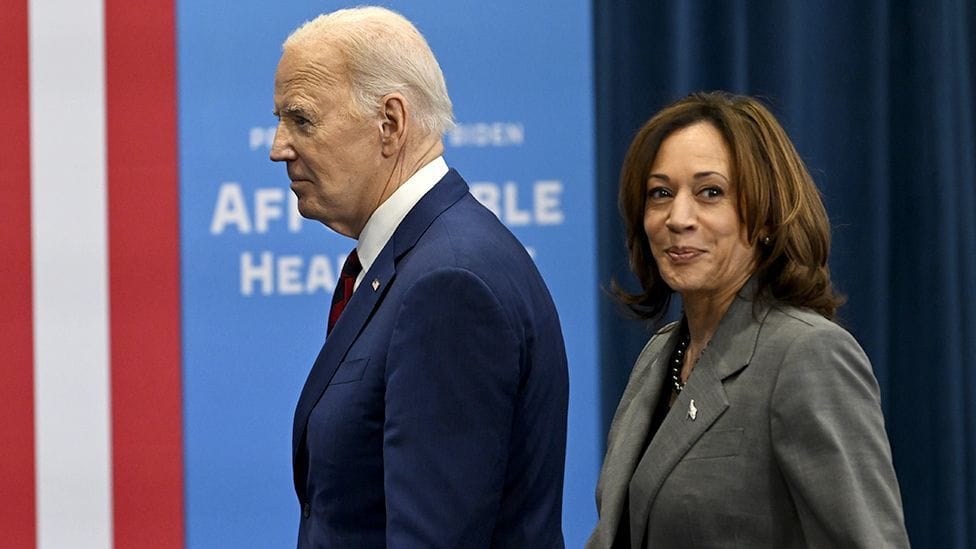Green Shoots?
Does the election of Keir Starmer and the ascension to Democratic nominee of Kamala Harris signal a brighter future for two of the West's landmark democracies?

It's been quite a while since I've written anything. The almost endless stream of Tory scandals and the sharp mental and physical decline of Joe Biden made everything a little too depressing to write about at length, and truthfully, it was being thoroughly documented elsewhere.
The inevitability with which Labour strode into government earlier this month meant that, whilst several media outlets (particularly the evermore deranged Telegraph newspaper) clung desperately to the dying embers of the insanity that is the Conservative Party, most other outlets began to take Labour seriously at long last.
The 2024 UK General Election was very unusual. Labour, out of power for 14 years, returned a landslide victory despite a share of the vote far smaller than most pollsters predicted. They won with 33.7% of the vote, equating to 9.7 million votes. Notably, this was fewer votes than when Jeremy Corbyn was trounced by Boris Johnson in 2019. In that election Labour won 10.3 million votes, and in 2017, where they also lost, they managed some 12.8 million votes.
The eventual outcome – a huge Labour majority – masked the inconvenient truth that the party did not perform as well in terms of raw votes as many predictions had indicated they might. It's important to note that this isn't that uncommon in British elections, historically. On election days gone by, Labour's results have tended to be less impressive than many opinion polls had predicted, generally because the Conservatives outperform their predicted share – it even has a name: the Shy Tory factor.

In the days preceding the General Election, the average opinion polls looked something like this:
- Labour: 39%
- Conservatives: 21%
- Lib Dems : 11%
- Reform: 17%
- Greens: 7%
In terms of the actual result, it transpired as follows:
- Labour: 35% (-4%)
- Conservatives: 24% (+3%)
- Lib Dems: 13% (+2%)
- Reform: 15% (-2%)
- Green Party: 7% (-)
Whilst the Conservatives did outperform their predicted share, no party under-performed their predicted share as dramatically as Labour. There's likely no one single reason for this. A combination of 'Shy Tory factor' where, when push came to shove, some traditional Conservative voters simply couldn't stomach supporting Keir Starmer's party. Likewise, some angry and discontented voters who threatened to back Reform may have reverted to the Conservatives as scandals enveloped Reform prior to election day. Likewise some traditional Labour supporters, conflicted about the party's stance on the Israel/Palestine conflict, may have been unwilling to cast their ballots as a result.
The Conservatives have been swift to highlight how Labour's share of the vote is low for a party commanding a huge lead in Parliament. Ironically, it's one of the few factually accurate statements they've made this year and we had to wait until after the election to get it. Although it is true, the Conservatives have benefited from an electoral system for decades in which the right-wing segment of the populace have overwhelmingly voted for them given the absence of serious right-wing alternatives. Centrists may have oscillated between them and the Liberal Democrats over time, but for the most part, they've had that demographic sewn up. Labour on the other hand have had to contend with the Liberal Democrats – and in recent years, the Greens – occupying their core demographic in England, and the Scottish National Party doing the same in Scotland, to an even greater extent.

That is to say that Reform, whatever you think of them, changed the electoral landscape enormously in the last election. The party – although really they're a private company with Nigel Farage the majority shareholder and not a political party – have successfully split the Conservative and right-wing vote for the first meaningful time in decades, as well as taking plenty of votes in traditional Labour 'red wall' seats.
Although I find them and everything they stand for to be pretty much reprehensible, their presence on this occasion helped deliver the change that the country has desperately required. I think it's unlikely they will ever break above 20% of the vote, barring some apocalyptic turn of events, and the damage they have inflicted on the Conservative Party may be terminal. While the Conservative Party will not disappear, it will either be diminished or changed beyond recognition through the assimilation of Reform MPs like Nigel Farage into the party apparatus. The most successful political party in history may permanently no longer resemble the values of the old Tory party. If the successive elevations of Boris Johnson and Liz Truss to the office of Prime Minister do end up signalling the death knell of the Tory party, it's no less than it deserves.
And so we have a new Prime Minister in Sir Keir Starmer; delightfully dull and thoroughly professional. It's too early to say whether Labour will live up to the promise of better days – with some fiscal hardship thrown in – ahead, but it's what the beginning of the road would look like if things are indeed to improve.
Britain has elected a former prosecutor (and son of a toolmaker, don'tcha know?) to wash away the stench of incompetence and corruption, the remaining question of 2024 – and it's a biggie – is will the United States do the same, or will they return a convicted felon, sexual abuser and insurrectionist to the White House?
When Joe Biden was elected in late 2020, I had hoped that Donald Trump's odious rhetoric was history. When armed insurrectionists stormed the Capitol on 6th January 2021 and Republican lawmakers denounced Trump's incitement of their actions, I was sure he was finished. And yet, his pervasive toxicity has only tightened its grip on the Republican Party and a corresponding decline in Joe Biden's mental acuity raised question marks over the incumbent President's ability to be re-elected. Several weeks ago Trump was seemingly on his way back to Washington as the presumptive electoral victor despite everything he had said, done and for which he has now been convicted. With the US Supreme Court granting the former President effective immunity from prosecution and a Republican Party packed with fanatical zealots hell-bent on power at any cost (JD Vance, I'm looking at you), it isn't an exaggeration at all to suggest that the future of American democracy is on the ballot in November.
After Biden's disastrous debate performance this month, the vultures appeared to be circling, but it is a criticism often levelled at the Democrats that they are simply too soft when push comes to shove to take the action required. Despite the seemingly obvious electoral defeat hurtling towards them in the aftermath of the debate, I doubted whether the party would have the stomach – or indeed the ability – to persuade Joe Biden to stand aside.
I'm delighted that they have managed to find the guts to do so, and though I am genuinely surprised about the swiftness and ease with which Kamala Harris has replaced him as Democratic nominee and inherited an enormous financial war-chest. Names such as Greg Newsom and Josh Shapiro were mooted as candidates in a hastily arranged open vote at the Democratic National Convention, but it appears the optics of such a political fistfight against the backdrop of a comparatively united Republican Party was deemed too risky to pursue seriously. So, Kamala Harris will be the lead name on the ticket this autumn.

Harris – in a similar way to Barack Obama – represents the hope of a progressive future for America. Obama's election was historic and a symbol of a changed United States, although arguably his success infuriated many racists (let's call a spade a spade) in the country to the point where populist figures were rallied behind. An electoral victory for Kamala Harris – a black woman of South Asian descent – would be a similarly seismic election result, and the result that the country desperately needs to ensure it remains a democratic nation. The first female President in a country which has only ever had one female vice president – Harris herself – would be a wonderful moment in American history, and just as importantly, a denunciation of the racism, misogyny and hatred that Trump's movement represents.
The alternative makes me shiver. Make no mistake, Trump will have learned lessons from his first Presidency, and he will not be so naive if granted a second chance at the White House. The future that could come to pass has already been outlined in black and white in the Project 2025 document which, if you are American and haven't heard about it, you need to read immediately. It outlines an authoritarian, anti-intellectual conservative regime where education and women's rights are dismantled and tightly controlled. Carbon-reduction schemes would effectively be scrapped. A nationwide abortion ban would be enforced. Pornography would be banned. Promotion of diversity, equity and inclusivity would be scrapped as part of a war against the "woke" ideology. It would be a society growing ever closer to George Orwell's 1984. And it is no mere pipe-dream: it is authored by former officials in Trump's administration. Chillingly, last night in an address to Christians in a rally, Trump promised that if they just came out and voted in November, they would fix it so "they never had to vote again."
In some ways, Keir Starmer's electoral victory has ushered in a hopeful era for Britain once more, where professionalism, standards and integrity are at the forefront of the United Kingdom's agenda on the global stage where previously xenophobia and sabre-rattling were flavour of the day. America faces a similar question in November: just what kind of country does it want to be?
How Americans answer that question will have a far greater impact on the rest of the world than a British election, such is the diminished nature of British power in the 21st Century. Yet I remain hopeful that, at the hour of greatest need, sense and reason will prevail and that America as a whole will reject Trump's offering for the future. Harris is already seeing a substantial improvement in polling performance over Joe Biden, and I suspect that the more voters see and hear from her, the more votes she may win – especially if Trump grows more desperate in his attacks.
2024 has the potential to be looked back on as a turning point in politics for Britain and for America. Whether it comes to pass remains to be seen... but we're half way there.

